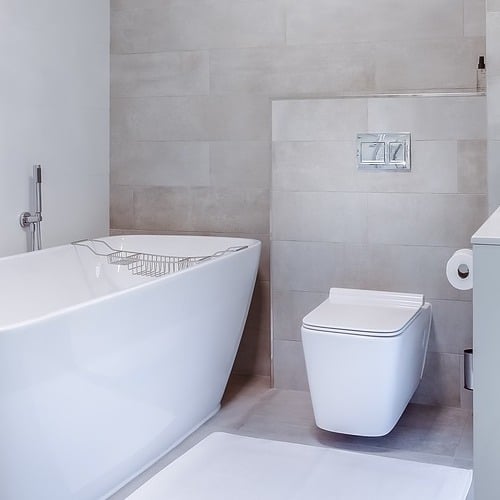Wet areas in a property are usually the spaces where sanitary fixtures are at or spaces that are exposed or subjected to high moisture, rain, or water. Such spaces are mainly the laundries (washing area of a house), backyard, roof, balcony, bathroom, or even kitchen.
Why is it important that these wet areas are waterproofed? Unlike water resistant materials that control and limit the moisture, waterproof materials are those that do not allow any water or moisture to seep through at all. Waterproofing the wet areas at home involves the application of waterproofing membrane, to ensure that no water or moisture can leak out of your wet areas and into the other parts of your house.
Waterproofing is essentially important if you own a house, as it is inevitable that certain part of your house will come into contact with water. If there is no sufficient prevention measure, it is just a matter of time that somewhere will start to leak. And if the leak is left undetected for a period long enough, damages in the house will potentially occur. Such damages are like growth of mold, which can be harmful to people with respiratory problems such as asthma, “concrete cancer”, where the steel reinforcing the concrete starts to rust, causing it to displace and will ultimately weaken the building’s foundations, decaying of wood/ timber flooring or structures, corrosion of plumbing and even compromising the electricity or other electrical appliances at home.
So, why should you waterproof your house? Aside from preventing the above-mentioned damages from occurring, waterproofing your house can help to prevent leaks and as well as provide a watertight seal that will stop any water from leaking. And a bonus point, it may even increase your property value, just as a badly waterproofed property will be reduced in value and put off any potential future buyers.
Waterproofing membranes that are of good quality and professionally installed/ applied can last a homeowner for a very long time. Most waterproofing contactors in Singapore provides a 12 month warranty upon completion of work, however, if correctly done, it should last for many years ahead.
At SWC Construction, we provide a non hacking and long lasting solution, that is High PU Injection Grouting. This method is an injection of liquid grouting material into the structure under pressure. During the grouting process, fissures (an opening or line of breakage made by cracking or splitting in structures) and pores are filled with the grouting material, which subsequently hardens and connects the disintegrated surfaces. PU injection grouting can help to fill the cracks fully as once the injection is administered, the foam expands to fill in the entire space of each crack. This fullness gives full coverage and protection from any water seepage. Another advantage of PU injection grouting is that the atmosphere’s moisture content does not matter. The foam can be injected into wet areas, which means you do not have to wait till the leakage area is completely dry before taking action against further water damage. Not to mention PU injection grouting remains flexible too.
How do you tell that your house may be leaking then? If you start noticing that your cabinets are moldy, or when your ceilings and walls are stained with patches of dampness, it may be a sign that somewhere has developed a water leakage. Obvious signs are like peeling off of paint, swelling skirting or even water droplets. Most homeowners solve problems like that by giving the stains a new coat of paint. However, this would only “aesthically” cover up the leakage. It is just a matter of time that patches of dampness surface again. As waterproofing is an iterative process, it is highly advised that homeowners consult contractors that have the relevant expertise and skills instead of solving the problem on your own.
If you have noticed any of these water leakage signs, do not hesitate to contact our team to find out more about the various types of waterproofing that can be applied for your house!



